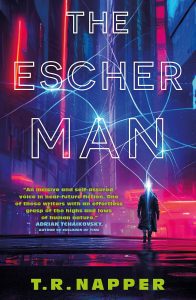The Escher Man by T.R. Napper: Review by Alexandra Pierce
 The Escher Man, T.R. Napper (Titan 978-1-80336-815-3, $17.99, 368pp, pb) September 2024. Cover by Julia Lloyd.
The Escher Man, T.R. Napper (Titan 978-1-80336-815-3, $17.99, 368pp, pb) September 2024. Cover by Julia Lloyd.
It’s 2101. Macau is filled with casinos and run by gangsters; Endel (aka Endgame), an Australian, is an enforcer for the main cartel, sent to kill traitors and anyone else who threatens the gang’s livelihood. Endel is a drunk and a gambler, and separated from his wife and child because of his behaviour. Billed as cyberpunk, T.R. Napper’s The Escher Man certainly meets Bruce Sterling’s “low life and high tech” criteria, filled as it is with both thugs and futuristic technology. Cochlear implants allow such gifts as simultaneous translations between languages; memory pins are used to supplement and enhance human memory.
The memory pins become a key MacGuffin for the action: Natural human memory is getting worse, and no one really knows why, so the pins are incredibly important. More of an issue, though, is that the memory pins can have mnemonic directives implanted within them – instructions, or even entire sets of new memories. Mr. Long, Endel’s boss, makes use of this to issue instructions, and guide Endel to his targets. As the novel progresses, it becomes clear that Endel’s memory has been tampered with far more than he realised.
I have two key frustrations with this novel. Calling it The Escher Man may either suggest something about Mr. Long, and the way he manipulates Endel (although he’s not in the novel enough to really warrant this interpretation); or, more likely, suggest something about Endel himself: That he feels like he’s going around and around without getting anywhere, perhaps. The latter is what my reading experience was like; for much of the novel, I felt like I wasn’t getting anywhere. Endel’s memories and identity are constantly being messed with and as a consequence, Endel as a character just doesn’t have much character, aside from “I am a violent man” and “I miss my family.” He essentially restarts (respawns, in gaming terminology) several times, in different contexts and with different motivations; while I as the reader know what he’s lost, I never ended up feeling particularly sorry for him. My lack of sympathy was in part a result of Endel’s lack of character, but it’s exacerbated by the fact that he is such a violent man, and we are never presented with any particularly redeeming features; love for one’s family isn’t enough, when it’s tied up with violence towards them. I think I was also meant to question whether or not he is, in fact, a violent man – but there is little evidence to make me argue with what Endel believes about himself. (The violence is an important aspect to be aware of: There is a great deal of it in this novel. Knives, guns, fists and kicks – they all get used with ferocity and ruthlessness, and described in some detail.) The restarting also meant there was little sense that the story was moving on, with no other narrative payoffs to make it worthwhile.
My other frustration was around the larger philosophical questions. The connection between memory and identity, and how we know who we are and what we should be doing, is the central question, and there are some excellent conversations between characters – especially the Ommissioners, or memory specialists – about what memory is and why it’s important. The commentary on whether effectively outsourcing memory to a technological device is a good idea is also an interesting one explored here. But the novel mostly deals with this issue at a surface level, and in later chapters leaves that discussion to one side in favour of a political one about who controls the means of production of the memory pins and for what reason – a question that seems to come from nowhere, with little earlier foregrounding to make it fit within the rest of the story.
The Escher Man presents some thought-provoking questions and shows that cyberpunk continues to be a relevant genre in the 21st century. It just doesn’t quite fulfill its promises on either characterisation or the philosophical side of things.
Interested in this title? Your purchase through the links below brings us a small amount of affiliate income and helps us keep doing all the reviews you love to read!
Alexandra Pierce is the editor and publisher of the nonfiction Speculative Insight: A Journal of Space, Magic, and Footnotes. She is an Australian and a feminist, and was a host of the Hugo Award-winning podcast Galactic Suburbia. Alex has edited two award-winning non-fiction anthologies, Letters to Tiptree and Luminescent Threads: Connections to Octavia E. Butler.
This review and more like it in the December 2024 issue of Locus.
 While you are here, please take a moment to support Locus with a one-time or recurring donation. We rely on reader donations to keep the magazine and site going, and would like to keep the site paywall free, but WE NEED YOUR FINANCIAL SUPPORT to continue quality coverage of the science fiction and fantasy field.
While you are here, please take a moment to support Locus with a one-time or recurring donation. We rely on reader donations to keep the magazine and site going, and would like to keep the site paywall free, but WE NEED YOUR FINANCIAL SUPPORT to continue quality coverage of the science fiction and fantasy field.
©Locus Magazine. Copyrighted material may not be republished without permission of LSFF.








